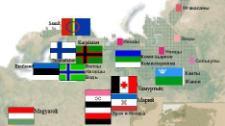Finno-Ugric World
The Meeting of the “Finno-Ugric” and “Russian Worlds”: National Minorities on the EU-Russia Border
 One of the consequences of the collapse of the Soviet bloc was the reinvigoration of nation-building across Eastern Europe and the former Soviet Union. This has taken place not only within the states themselves, but also across political borders, not least by turning the issue of the protection of co-ethnics in neighbouring states into a major area of both domestic politics and international relations. Language has played an important role in this, as a key cultural marker of ethnicity. Russian policy towards the ‘Russian-speaking minority’ in the former Soviet republics, framed as ‘compatriots abroad’ and mobilised in the construction of a transnational ‘Russian World’, is arguably the most prominent and extensively studied case. Transnational minority issues in the region have become highly topical in strategic and security studies since the Russian interventions in Georgia and Ukraine, while the ‘discrimination of the Russian-speaking minority’ dominates relations between the Russian Federation and the Baltic States, now part of the European Union.
One of the consequences of the collapse of the Soviet bloc was the reinvigoration of nation-building across Eastern Europe and the former Soviet Union. This has taken place not only within the states themselves, but also across political borders, not least by turning the issue of the protection of co-ethnics in neighbouring states into a major area of both domestic politics and international relations. Language has played an important role in this, as a key cultural marker of ethnicity. Russian policy towards the ‘Russian-speaking minority’ in the former Soviet republics, framed as ‘compatriots abroad’ and mobilised in the construction of a transnational ‘Russian World’, is arguably the most prominent and extensively studied case. Transnational minority issues in the region have become highly topical in strategic and security studies since the Russian interventions in Georgia and Ukraine, while the ‘discrimination of the Russian-speaking minority’ dominates relations between the Russian Federation and the Baltic States, now part of the European Union.
The Russian Federation is not unique, however, in pursuing policies that construct a politically significant transnational ethno-cultural ‘world’ in the region. Finland, Estonia and Hungary have been pursuing policies of the promotion of cross-border Finno-Ugric cooperation, with origins in beliefs about ethnic kinship based on the genetic relationship of Finno-Ugric languages, underpinned further by a broadly shared history and maintained feelings of solidarity among the different Finno-Ugric groups. Despite its ‘mythological’ origins, this transnational cooperation has over the past decades developed into a complex political phenomenon which is sometimes conceptualised as the ‘Finno-Ugric World’. Crucially, this ‘Finno-Ugric World’ also encompasses a number of smaller Finno-Ugric ethnic groups based in Russia and Ukraine, leading Finland, Estonia and Hungary to develop policies for supporting the languages, cultures and rights of these minorities as well.
The focus of this project, carried out by Dr Konstantin Zamyatin, is the analysis of the complexities of transnational ethnopolitics along EU’s eastern border. In particular, the project explores the similarities and differences, interactions and interdependencies between, on the one hand, the policies of Estonia, Finland and Hungary directed at promoting minority languages and cultures in Russia and Ukraine, and on the other, the policy of the Russian Federation in supporting Russian language and culture among ‘Russian-speakers’ in these countries. Rogers Brubaker (1996, 2011) suggested the triadic nexus of ‘nationalising states’, ‘national minorities’ and ‘external homelands’ as a framework for studying internationalised ethnopolitics in post-communist countries. This research will focus on the triangle of interrelations between: states that are pursuing minority policies abroad and their target minority communities; states in their role of ‘external homeland’ and states in their role of ‘nationalising states’; and finally, host states and specific minority communities.
It includes the following research questions:
(1) In what way and to what effect is ‘ethnic kin’ abroad being integrated by states on the EU-Russia border into their respective nation-building projects, and how does this influence security issues in the region?
(2) To what extent are these transnational projects interconnected, and what role do state relations play in promoting transnational minority cooperation or, on the contrary, increasing interstate tensions?
(3) How do these projects (whether seen as a threat or a resource) influence neighbouring countries’ domestic politics, and what are the states then doing to restrict or channel them?
The objectives of the project are to enhance our understanding of:
(1) the politics of statehood, nationality and ethnicity across the EU-Russia border (and more generally) in the context of 21st-century nation-building and inter-state relations (specifically by comparing the relevant countries’ policies targeting ‘ethnic kin’ abroad and public discourses surrounding the issue).
(2) the possibilities of non-conflictual solutions to transnational minority issues (specifically by identifying the place of ‘Finno-Ugric cooperation’ in the context of bilateral and EU-Russia relations and contrasting it to the Russian ‘compatriots abroad’ project).
(3) the tools that international society has to promote minority rights and to contain aggressive nation-building (specifically by comparing the impact of nation-building projects on the neighbouring states’ minority politics).
This research is conducted in the interdisciplinary framework of Finno-Ugrian Studies and Russian Studies (understood as Area Studies). The theoretical background includes studies on ethnicity and nationalism relevant to the region, with an emphasis on public policy studies in comparative politics (e.g. Prina 2015, Hale 2008), international relations theories (Prozorov 2006, Engl & Mitterhofer 2015), and international law (Hurlburt 1999, Arp 2008). The core approach taken is that of policy analysis combined with critical discourse analysis. It brings together both foreign and domestic policy of the relevant states, assessing the actual policy scope and its implementation beyond the ideological rhetoric that typically accompanies such endeavours.
For further information contact: konstantin.i.zamyatin@durham.ac.uk.


/prod01/prodbucket01/media/durham-university/research-/research-centres/open-world-research-initiative-owri/69559.jpg)